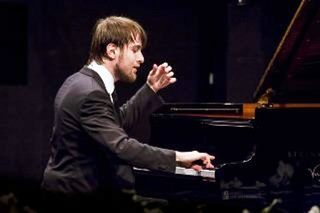|
Back
The Poet Speaks, The Artist Plays New York
Perelman Auditorium, Carnegie Hall
12/07/2016 -
Robert Schumann: Kinderszenen, Op. 15 – Toccata, Op. 7 – Kreisleriana, Op. 16
Dmitri Shostakovich: Prelude and Fugue Nos. 4, 7, 2, 5 & 24, Op. 87
Igor Stravinsky: Three Movements from Pétrouchka
Daniil Trifonov (Pianist)

D. Trifonov (© Nicolas Brodard)
Since I don’t know any music reviewer who can do credit to Daniil Trifonov, we’ll let Robert Schumann do the honors.
The last movement of Kinderszenen is Der Dichter spricht: “The Poet Speaks.” And no better words describe this poet of the piano.
Not that Mr. Trifonov ever plays the Oscar Wilde poet. He doesn’t lean forward and wipe his brow, he doesn’t give excess emotion where none is due. His rare physical affectations-like crushing his head to the piano at the finish of the first movement of Pétrouchka was amusing drama for a puppet ballet. His virtual imitation of Baroque piano-playing was ideal for the Shostakovich Preludes and Fugues, a work written in commemoration of Johann Sebastian Bach.
But as he showed earlier this year playing all the Rachmaninoff Concertos with the New York Philharmonic, Daniil Trifonov is that singular kind of artist who melds the composer’s directions with an inner passion of his own.
The result is, yes, the poet speaking.
The first half consisted of poets Trifonov and Schumann, and Schumann would have been so happy to have his musical pictures illustrated with such joy. The 13 Children’s Pieces were of course written about, not for children. Mr. Trifonov was given the task of describing the dreams of children to children, and such was the imagery of his music that one could almost imagine Lewis Carroll describing “Alice” to a coterie of his young admirers.
The “action” dreams–Blind Man’s Bluff, Knight of the Hobby Horse, Frightening–were played with a nervous alacrity. Yet this listener was longing for that inner Schumann, that of the child sleeping, the stories, the “perfect happiness”...and finally, Trifonov, the poet speaking.
After the Schumann Toccata, played with his dazzling energy, Mr. Trifonov went back to Schumann’s fantasies in Kreisleriana. Holding our attention for each of the eight pieces, he provided pleasures for the body and mind together. Schumann alternated fast and slow in the music, but one didn’t notice that. As if the pianist was holding a single puppet string (that came later), he danced the pieces one after the other.
And yes, just as Beethoven’s deafness was predicted in his strange dissonances, Mr. Trifonov offered a series of hallucinations, the same which would break the composer’s mind and later send him to the asylum.
If pianists are sometimes hesitant to show too much literalism in Schumann, no reluctance could be shown for the Stravinsky of the Pétrouchka scenes. Yes, this was pyrotechnics, fireworks galore. But Mr. Trifonov happily told the puppet story. He was sad where the puppet was sad, he whirled with the Shrovetide Fair. Mr. Trifonov may be a Romantic at heart, but when necessary, he became the actor.
Yet of all the music heard last night, I was most taken with five Preludes and Fugues from the Shostakovich “24”. It is fatuous to imagine a 17th Century composer listening to music of the 20th Century. But I have a feeling that Bach, while startled at various transpositions and harmony, would have listened with something approaching satisfaction at this performance.
The pieces were played with Baroque simplicity. Not affectations or harpsichord replication. Rather, he played with a needed flexibility when necessary, or a literalness of the Shostakovich notes. One could hear the church bells in the Seventh Fugue and the chorale harmonies in the Second, one could note the shifting of colors in the fugues, and the mastery in the Moderato finale, by far the longest piece in the set.
Wisely, after this literal crazy carnival of the Stravinsky, Mr. Trifonov played only two encores, both by Nikolai Medtner. For the record, Carnegie Hall provided me with the F Minor Fairy Tale, Opus 26, number 3, and “Campanella”, the B Minor Fairy Tale, Opus 20, number 2.
The pianist didn’t introduce them, but that was fine. The music and the poetry spoke for themselves.
Harry Rolnick
|